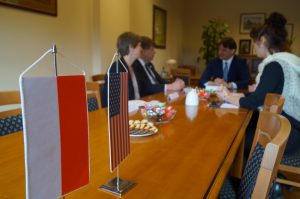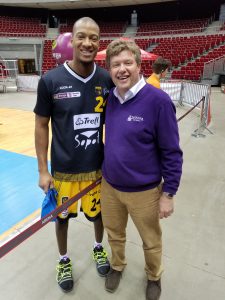As someone who is neither Polish nor Kashubian, I have spent what some might call an inordinate amount of time studying the history, culture and country of Poland.
My earliest visits were with the U.S. Department of State, as America assisted Poland in rebuilding its economy and social systems after so many years of Soviet control. Back then, I had the honor of helping to rebuild a free system of communication.
On my most recent visit, I had the honor of supporting Winona’s sibling-city relationship with Bytow, a town populated by the same Kashubian Poles who settled in Winona. Leading our delegation was City Council Member Michelle Alexander and former City Council Member Tim Breza, with WSU professor Małgorzata Plecka and me in supporting roles. In addition to our city-to-city conversations, we also explored ways that Winona State University might further partner with Pomeranian University on projects of mutual interest.
Since my first visit to Poland in 1990, I’ve had the distinct pleasure of watching the evolution of this proud country and its people. What Poland in general and the Kashubian-Poles in particular have achieved is remarkable.
Thirty years after the end of the Soviet era, Poland’s economy is vibrant. Throughout the country, new roads, new airports, and new businesses manifest their ingenuity. During our visit, we toured a world-class company in Bytow called Drutex. It reminded me of touring Fastenal: super high-technology, a tremendous spirit of innovation and entrepreneurship, and great global success. I even had the chance to see a Winona State alumnus and basketball star—Jonte Flowers—play on a professional Polish basketball team in a beautiful new arena.
What’s more, the people of Poland have achieved all this while retaining their history and traditions. In fact, the hotel in which the Mayor of Bytow hosted our delegation was a 600-year-old Teutonic castle, beautifully preserved yet thoroughly modernized! Yet in many ways, this success was unsurprising to me, given when I’ve seen and learned during my time here in Winona.
Our beautiful Basilica of St. Stanislaus Kostka was built by hand by the Poles who settled Winona and wanted a church becoming of their cultural heritage. (Stanislaus Kostka is a patron saint of students, so it seems appropriate with Winona’s many schools, the college, and the universities.) Local businesses that fuel the Winona economy—such as Fastenal, We-No-Nah Canoe and RTP, to name just a few—were started by Polish-Americans and Kashubian-Americans. We’ve enjoyed political leadership from Winonans of Polish heritage. Our Polish Cultural Institute & Museum helps Winona preserve these great history and traditions. Father Paul Breza of Winona is venerated in Bytow, and there is a plaque dedicated to him in the City Hall there.
What Polish-Americans and Kashubian-Americans have achieved here is truly remarkable. And the fact that Bytow, Poland, and Winona have all prospered tells me something about the Polish and Kashubian character. Given freedom and opportunity, Poles and Kashubians can achieve anything. Americans too!
Descendants of the Poles and Kashubians who settled and built Winona have good reason to be proud of what they have achieved. They are a great people, divided now by geography and language, but united in a common history and culture. And even more, they are united by ingenuity, resourcefulness, a strong work ethic, hospitality, faithfulness, and a great imagination.
So, I would like to share a simple thought with the Polish-Americans and Kashubian-Americans who live in Winona: On behalf of Winonans who, like me, are neither Polish nor Kashubian, thank you — or rather Dziekuje Bardzo and Dzãkùjã Dzãka Dzãczi — for the great community you have helped build here!
Scott R. Olson
President – Winona State University

